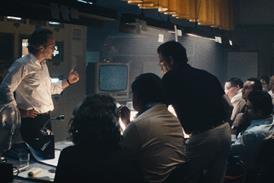Dir: Laurent Cantet. France. 2001. 133 mins.
Laurent Cantet delivers brilliantly on the promise of his outstanding 1999 feature debut Human Resources with another compelling look at an individual caught up in trouble at the workplace. L'Emploi Du Temps is based on the true case of a middle manager who for months concealed from his family the fact that he had lost his job. The real-life man eventually exploded into violence, but the film avoids the melodramatic potential of the material in favour of a delicate, beautifully observed portrait of a man on the edge.
The downbeat subject, unsensational treatment and lack of star names present a marketing challenge, but the film's international profile will be boosted by plentiful festival outings: it has already played in Toronto and Venice, where it took the top prize, the Lion of the Year, in the Cinema of the Present section. With careful handling, L'Emploi Du Temps could quietly thrive in niche cinemas if pitched at an audience hungry for mature, thought-provoking fare and can look forward to extensive future exposure on the small screen.
Vincent (Aurelian Recoing), a middle-aged management consultant based in Southern France, is first discovered rushing between a series of important meetings. However it's immediately clear that he is, in fact, driving around aimlessly and sleeping in his car, having been dismissed weeks ago from the job which he has held down for many years (the film's French title conveys the double meaning of both a timetable and also the main character's need to use up his days).
Not only does Vincent reject all offers of help from former colleagues, he even refuses to confide in Muriel, his wife (Karin Viard), on the ostensible grounds that this strong, intelligent woman is "too fragile" to deal with the blow. To facilitate the deception, he claims to have been offered a high-powered new job which will require him to commute to Geneva.
Here, he infiltrates the premises of a development agency which advises businesses in Third World countries and, on the strength of what he learns there, invents a whole new professional identity for himself, even persuading friends and acquaintances to sink their saving into bogus investment schemes.
However Vincent's fabrications and lifestyle become increasingly difficult to maintain: he has trouble deterring his family from visiting his non-existent new apartment (part-funded by his father) and is eventually reduced to joining a gang smuggling bootleg consumer goods into Switzerland in order to generate some income.
A thread of dark, absurdist humour weaves through such scenes as the one where the gang leader visits Vincent's family and lectures his small son over dinner on the evils of the black market. But the film's real subtlety and punch lie in the way Cantet resists turning his story into the conventional tragedy of a man trapped by circumstances beyond his control.
Instead, he paints the portrait of an individual profoundly disconnected from the world (Cantet typically shoots Vincent outside windows looking in) and in deep denial about himself. He had been, it becomes clear, not the victim of unfair dismissal, but was made redundant because he had already lost his commitment to his job. He is shown drifting ever deeper into his own elaborate fantasies, and there's an ambiguity which continues up until the final, unexpected scene about the extent to which he believes in them himself.
Viard and the remainder of the supporting cast are faultless, but L'Emploi Du Temps belongs to Recoing. Little known outside France and not conventionally charismatic, he plays a chameleon character who melts consistently into his surroundings, and yet the actor manages to command the screen throughout the film.
Visually, it's a superbly staged piece, with Cantet's effortless, unshowy mastery of his medium evident in every scene: to single out just two, a long sequence in which Vincent and Muriel lose each other on a mountain top, and a confrontation, full of awkward looks and silences, with his family which knows the truth but leaves everything unspoken.
Prod co: Haut et Court.
Co-prods: Arte, Rhone-Alpes Cinema, Havas Images.
Int'l Sales: Celluloid Dreams.
Prod: Caroline Benjo.
Scr: Cantet, Robin Campillo.
Dop: Pierre Milon.
Prod des: Romain Denis.
Ed: Campillo.
Music: Jocelyn Pook.
Main cast: Aurelian Recoing, Karin Viard, Serge Livrozet, Jean-Pierre Mangeot, Monique Mangeot.



















No comments yet